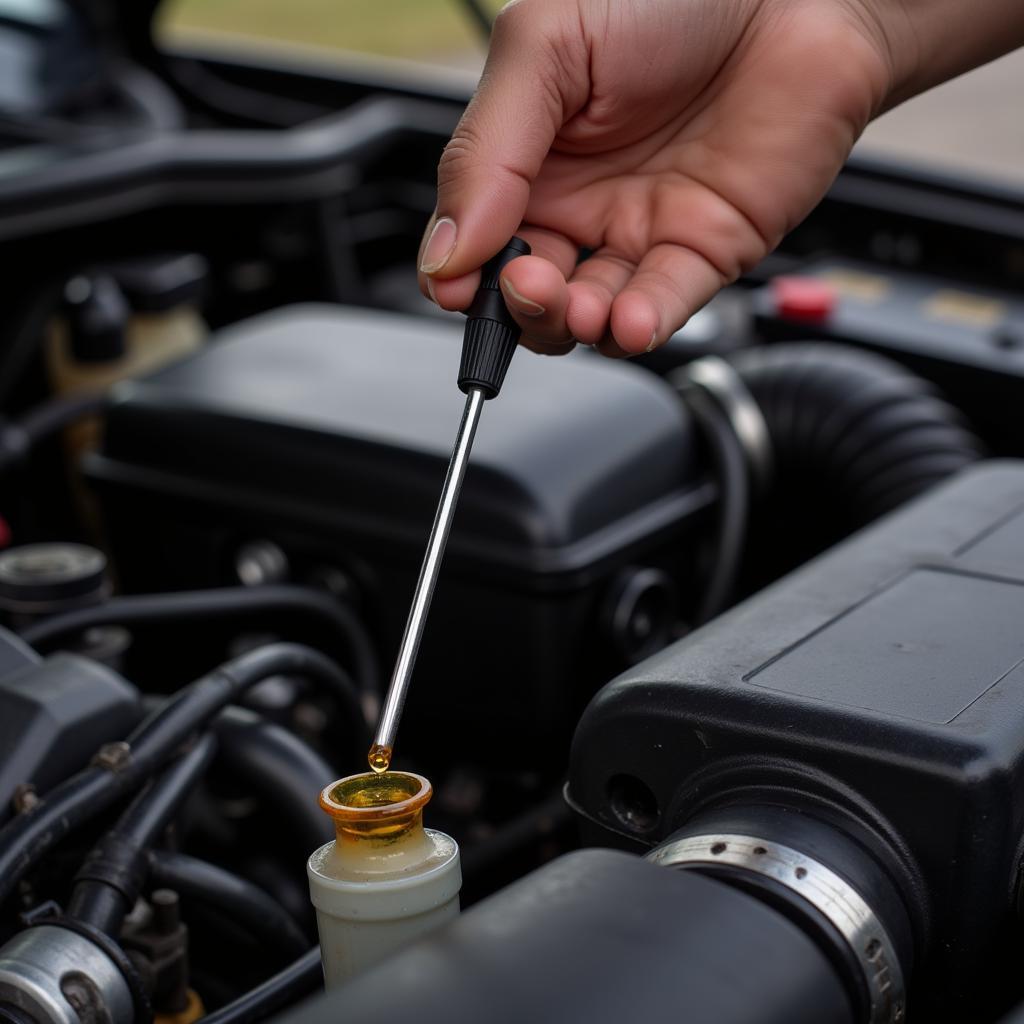Basic Routine Car Maintenance is crucial for ensuring your vehicle’s longevity, performance, and safety. Regular upkeep not only prevents costly repairs down the line but also contributes to a smoother, more enjoyable driving experience. This comprehensive guide will delve into the essential aspects of basic car maintenance, equipping you with the knowledge and confidence to keep your car in top condition.
Why Basic Routine Car Maintenance Matters
Regular car maintenance is like giving your car a regular health check-up. It helps identify potential issues early on, preventing them from escalating into major problems. Think of it as an investment, not an expense. By addressing minor issues promptly, you’ll avoid hefty repair bills and extend the lifespan of your vehicle. Moreover, a well-maintained car is safer, more fuel-efficient, and retains its value better.
Essential Basic Routine Car Maintenance Tasks
Basic Routine Car Maintenance: Under the Hood
- Checking Fluids: Regularly inspect your engine oil, coolant, brake fluid, power steering fluid, and windshield washer fluid. Top them off as needed and look for any leaks or unusual colors. Low or contaminated fluids can lead to serious engine problems.
- Inspecting Belts and Hoses: Look for cracks, fraying, or looseness in belts and hoses. These components are crucial for engine function, and their failure can lead to overheating or other critical issues.
- Air Filter Replacement: A dirty air filter restricts airflow to the engine, reducing fuel efficiency and performance. Replace it according to your car’s maintenance schedule.
 Checking Engine Oil Level
Checking Engine Oil Level
Basic Routine Car Maintenance: Keeping Your Car Rolling
- Tire Pressure and Rotation: Maintaining correct tire pressure is essential for safety, fuel economy, and tire longevity. Rotate your tires regularly to ensure even wear and tear.
- Brake Inspection: Check your brake pads and rotors for wear and tear. Squeaking or grinding noises are often indicators of brake problems. Don’t compromise on safety; address brake issues promptly.
- Suspension Check: A well-functioning suspension system provides a smooth and comfortable ride. Look for signs of wear and tear in shocks and struts.
Basic Routine Car Maintenance: Electrical Systems
- Battery Check: Ensure your battery terminals are clean and corrosion-free. A weak battery can leave you stranded. Have it tested regularly, especially during extreme weather conditions.
- Lights and Signals: Check all your lights, including headlights, taillights, brake lights, and turn signals. Replace any burnt-out bulbs immediately.
How Often Should You Perform Basic Routine Car Maintenance?
The frequency of basic car maintenance depends on various factors, including your car’s make and model, driving conditions, and mileage. Refer to your owner’s manual for specific recommendations. However, a general rule of thumb is to perform basic checks every month and more thorough maintenance every 3,000-5,000 miles.
“Regular maintenance isn’t just about keeping your car running; it’s about ensuring your safety and preventing costly surprises down the road.” – John Davis, Automotive Engineer
Basic Routine Car Maintenance: A Small Investment, Big Returns
By diligently following a basic car maintenance routine, you’re not just preserving your vehicle’s mechanical integrity; you’re also investing in peace of mind. A well-maintained car is a reliable car, and that’s something worth its weight in gold.
“Don’t wait for something to break before you fix it. Proactive maintenance is the key to a long and happy life for your car.” – Maria Sanchez, Certified Mechanic
In conclusion, basic routine car maintenance is essential for keeping your car running smoothly, safely, and efficiently. By following the simple steps outlined in this guide, you can avoid costly repairs, extend the life of your vehicle, and enjoy a more confident driving experience. For expert advice or assistance, connect with us at AutoTipPro. Call us at +1 (641) 206-8880 or visit our office at 500 N St Mary’s St, San Antonio, TX 78205, United States.
FAQ
- What is the most important basic car maintenance task? Regularly checking your fluids is crucial.
- How often should I change my oil? Consult your owner’s manual for specific intervals.
- What are the signs of a bad battery? Slow cranking, dim headlights, and clicking sounds are common indicators.
- How do I check my tire pressure? Use a tire pressure gauge and compare the reading to the recommended pressure listed on the driver’s side doorjamb.
- Why is tire rotation important? It promotes even wear and tear, extending tire life.
- What should I do if my check engine light comes on? Get your car diagnosed by a qualified mechanic as soon as possible.
- How can I find a reliable mechanic? Ask for recommendations from friends and family or check online reviews.




Leave a Reply